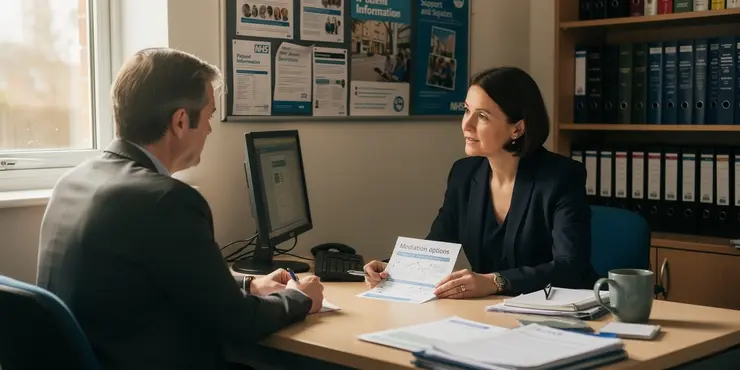Find Help
More Items From Ergsy search
-

Redundancy Coaching Couch 7: Redundancy and Judgement.MTS
Relevance: 100%
-

Redundancy Coaching Couch 4:Redundancy and Language
Relevance: 82%
-

Redundancy Coaching Couch 5: Redundancy and Feedback.MTS
Relevance: 82%
-

Redundancy Coaching Couch 1: Redundancy and Presuppositions
Relevance: 82%
-

Redundancy Coaching Couch 2: Redundancy and Passion
Relevance: 81%
-

Redundancy Crusader and Annabel Kaye on communications in redundancy (5).MTS
Relevance: 79%
-

Redundancy Crusader and Annabel Kaye on scope and scale of redundancy (3).MTS
Relevance: 77%
-

Redundancy Crusader and Annabel Kaye on the Current Model of Redundancy (1).MTS
Relevance: 77%
-

Redundancy Crusader and Annabel Kaye on making redundancy a better experience (2).MTS
Relevance: 76%
-

What is the primary purpose of redundancy?
Relevance: 75%
-

What are the legal requirements for redundancy in the UK?
Relevance: 75%
-

What is the primary purpose of redundancy?
Relevance: 74%
-

What are the legal requirements for redundancy in the UK?
Relevance: 74%
-

How is redundancy pay calculated in the UK?
Relevance: 74%
-
Redundancy Coaching Couch 3: States
Relevance: 74%
-

Public Sector Pension Changes | McCloud Judgement | NHS Pensions etc.
Relevance: 74%
-

What is the notice period for redundancy?
Relevance: 73%
-

What is redundancy pay and who is eligible for it?
Relevance: 72%
-

What is redundancy pay and who is eligible for it?
Relevance: 72%
-

HOW A REDUNDANCY WORKS - General Information
Relevance: 72%
-

Can employees request voluntary redundancy?
Relevance: 72%
-

What is a fair selection process for redundancy?
Relevance: 72%
-

Can an employee appeal a redundancy decision?
Relevance: 71%
-

What is the role of trade unions in the redundancy process?
Relevance: 70%
-

What alternatives should be considered before redundancy?
Relevance: 68%
-

Frequently asked questions about redundancy from ACAS
Relevance: 68%
-

What happens if an employer does not follow the redundancy process?
Relevance: 68%
-

Are there any protections for employees on maternity leave during redundancy?
Relevance: 67%
-

What support can employees expect during redundancy?
Relevance: 67%
-

How should companies consult employees about redundancy?
Relevance: 67%
-

How should companies consult employees about redundancy?
Relevance: 66%
-

How should employers manage the emotional impact of redundancy on employees?
Relevance: 66%
-

Understanding Your Rights: Legal Support for Families During Economic Turbulence
Relevance: 32%
-

Can eviction affect my credit score?
Relevance: 27%
-

In what ways can pre-trial motions affect the time it takes for a case to come to court?
Relevance: 22%
-

What Happens at Small Claims Court? Making a Court Claim for Money
Relevance: 22%
-

What is the fiduciary duty of directors to shareholders?
Relevance: 20%
-

What is fiduciary duty and how does it relate to director disputes?
Relevance: 19%
-

How does driving under the influence relate to dangerous driving?
Relevance: 18%
-

What are some common outcomes of property litigation?
Relevance: 16%
Possibilities are opportunities
Remaining open to new possibilities is a mindset that fosters personal growth and enriches life experiences. Embracing a receptive attitude allows individuals to explore uncharted territories, take calculated risks, and discover hidden potentials. It involves being adaptable to change, viewing challenges as opportunities, and constantly seeking ways to expand one's horizons.
Be open to new opportunities
Openness to new possibilities encourages creativity and innovation, as it invites diverse perspectives and fresh ideas into one's life. It also enhances resilience, enabling individuals to navigate uncertainties with optimism and adaptability. This mindset empowers people to break free from limiting beliefs, encouraging continuous learning and self-discovery. By remaining open to new possibilities, individuals can build a more fulfilling and dynamic life, characterized by curiosity, exploration, and a willingness to embrace the unknown.
Redundancy Coaching Couch 7: Redundancy and Judgement.MTS
Understanding Redundancy in the UK
Redundancy, a term many dread, refers to a situation where an employer reduces their workforce because a job or several jobs are no longer necessary. In the UK, redundancy can bring about significant emotional and financial distress, which is why proper redundancy coaching can be immensely beneficial. Redundancy Coaching Couch 7 addresses these issues, particularly the interplay between redundancy and judgment.The Role of Redundancy Coaching
Redundancy coaching aims to support individuals through the challenging transition of losing their job. The objective is to help them process their emotions, rebuild their confidence, and recalibrate their career trajectory. The seventh series of Redundancy Coaching Couch emphasizes the psychological toll of redundancy and how judgment, both self-imposed and external, can exacerbate this issue.Judgement and Its Impact
Judgment can stem from various sources - employers, colleagues, friends, or even within oneself. Individuals may feel judged for being made redundant, often internalizing this as a personal failure. This judgment can lead to feelings of shame, reduced self-esteem, and hesitation in seeking new opportunities. Redundancy Coaching Couch 7 tackles these feelings head-on, providing strategies to reframe this experience and challenge negative self-talk.Strategies for Overcoming Judgement
The coaching programme offers several strategies for overcoming judgment: 1. **Self-Compassion**: Encouraging individuals to treat themselves with kindness and understanding, rather than self-criticism. 2. **Reframing the Situation**: Viewing redundancy as a new beginning rather than an end can help shift perspectives. 3. **Support Networks**: Leaning on family, friends, and professional networks can provide the emotional backing necessary to navigate this tough time. 4. **Professional Guidance**: Seeking help from career coaches can offer tailored advice, helping individuals to rebuild their careers effectively.The Legal Perspective
It's also essential for individuals facing redundancy in the UK to understand their legal rights. The UK law stipulates that employees are entitled to redundancy pay, a notice period, and the right to time off to find a new job if they’ve been with their employer for at least two years. Knowing these rights can alleviate some of the stress and anxiety associated with redundancy.Conclusion
Redundancy Coaching Couch 7: Redundancy and Judgement.MTS serves as an invaluable resource for those facing redundancy in the UK. By addressing the pervasive issue of judgment and providing practical strategies to overcome it, this coaching series helps individuals navigate their journey with greater confidence and resilience.New Chances to Grow
Staying open to new chances helps us grow and have better life experiences. Being open-minded lets us try new things, take smart risks, and find hidden talents. This means we can handle change well, see problems as new chances, and look for ways to learn and grow.
Welcome New Chances
Being open to new things helps us be creative and come up with new ideas. It also makes us stronger and able to deal with changes in a positive way. This way of thinking helps us learn more about ourselves and the world. By being open to new chances, we can have exciting lives full of curiosity and new adventures.
Redundancy Coaching Couch 7: Redundancy and Judgement
What is Redundancy in the UK?
Redundancy is when a company needs fewer workers because some jobs are no longer needed. This can be very upsetting, both emotionally and financially. In the UK, redundancy coaching can help a lot. Redundancy Coaching Couch 7 talks about redundancy and the issue of judgment linked to it.How Can Redundancy Coaching Help?
Redundancy coaching helps people who have lost their jobs. It teaches them to handle their feelings, boost their confidence, and plan their next career steps. The seventh series of Redundancy Coaching Couch focuses on the mental stress of redundancy and how feeling judged can make it worse.What is Judgment and Why Does it Matter?
Judgment can come from many places – like employers, colleagues, or even oneself. People might feel judged or blame themselves for being let go. This can lead to shame and low self-esteem and can make it hard to look for new jobs. Redundancy Coaching Couch 7 helps people deal with these feelings and encourages positive self-talk.How to Deal with Judgment
The coaching program suggests ways to deal with judgment: 1. **Be Kind to Yourself**: Treat yourself with care and avoid self-criticism. 2. **Change Your Perspective**: Think of redundancy as a new start rather than an ending. 3. **Lean on Support**: Use help from family, friends, and work networks during this difficult time. 4. **Get Professional Help**: Career coaches can provide personalized advice to help rebuild your career.Know Your Legal Rights
In the UK, it is important to know your rights if you face redundancy. UK law says employees should get redundancy pay, a notice period, and time off to look for a new job if they've been with their employer for at least two years. Knowing your rights can reduce stress.Conclusion
Redundancy Coaching Couch 7: Redundancy and Judgement is a helpful resource for anyone facing redundancy in the UK. It tackles the tough feelings of judgment and offers strategies to overcome them, helping people move forward with more confidence.Frequently Asked Questions
What is redundancy?
Redundancy is a form of dismissal from your job, caused by your employer needing to reduce the workforce.
What are my rights if I am made redundant?
In the UK, you have the right to statutory redundancy pay if you have been working for your employer for more than 2 years. You also have the right to a notice period, consultation, and the chance to move into alternative work, if available.
How is redundancy pay calculated?
Redundancy pay is based on your age, length of service, and weekly pay, capped at £544 per week. You'll get 1.5 weeks' pay for each year of service over the age of 41, 1 week's pay for each year between ages 22 and 40, and 0.5 week's pay for each year up to age 22.
What is a fair redundancy process?
A fair redundancy process includes a genuine reason, fair selection criteria, proper consultation, and consideration of alternative employment within the company.
Can I challenge my redundancy?
Yes, you can challenge redundancy if you believe it to be unfair or discriminatory. Initially, raise a grievance with your employer, and if unresolved, you may take it to an employment tribunal.
What should my redundancy notice include?
Your redundancy notice should include the reason for redundancy, how you have been selected, how long your notice period is, and details of your redundancy pay.
How long is the redundancy notice period?
The statutory notice period is at least 1 week if employed between 1 month and 2 years, 1 week for each year if employed between 2 and 12 years, and 12 weeks if employed for 12 years or more. Contractual notice may be longer.
Am I entitled to time off to look for a new job?
Yes, if you have been continuously employed for at least two years, you are entitled to reasonable time off with pay during your notice period to look for alternative employment or arrange training.
What is voluntary redundancy?
Voluntary redundancy is when an employer asks employees to volunteer for redundancy, often offering additional benefits over statutory redundancy pay to encourage volunteers.
Can I refuse to take voluntary redundancy?
Yes, you can refuse voluntary redundancy. It’s a voluntary process, so it should be your decision whether to accept any offer.
What should I do after being made redundant?
After redundancy, update your CV, start job hunting, consider training to improve your skills, and check for benefits you may be entitled to, such as jobseeker's allowance.
Can I get redundancy pay if I find a new job during my notice period?
If you find a new job while on redundancy notice, you are still entitled to redundancy pay, but you need to inform your employer. This is provided you stick to the notice terms.
What happens if my employer goes bankrupt?
If your employer goes bankrupt, you can claim redundancy pay from the National Insurance Fund through the government's Redundancy Payments Service.
What are collective redundancies?
Collective redundancies occur when an employer is making 20 or more employees redundant within 90 days. They require formal consultation with employee representatives or trade unions.
What is the purpose of redundancy consultation?
The purpose of consultation is to discuss the reasons for redundancy, explore alternatives, and discuss selection criteria and ways to avoid or mitigate the need for redundancy.
What does "redundancy" mean?
Sometimes jobs go away because the company needs fewer workers. This is called redundancy. It means you lose your job.
What can I do if I lose my job because of redundancy?
Losing a job can be hard. Here is what you need to know:
- Redundancy pay: You might get some money when you leave. This is called redundancy pay. It depends on how long you worked there.
- Notice period: Your boss should tell you in advance before your job ends. This time is called the notice period.
- Support: You can get help to find a new job. This might include training or advice.
It might help to talk to a union or ask for advice from a support service. They can help you understand what to do next.
In the UK, you can get redundancy money if you have worked for your boss for over 2 years. You also get time to prepare for leaving your job. Your boss should talk to you about it and help you find a new job if they have one.
How do you work out redundancy pay?
When you lose your job because of redundancy, you can get some money. This is called redundancy pay. How much money you get depends on your age, how long you have worked, and your weekly pay. The most you can get each week is £544.
If you are older than 41, you get 1.5 weeks of pay for each year you worked. If you are between 22 and 40 years old, you get 1 week of pay for each year you worked. If you are younger than 22, you get 0.5 weeks of pay for each year you worked.
If you need help understanding this, you can ask someone to explain. You can also use tools like text-to-speech to read the information out loud.
What is a fair redundancy process?
A fair redundancy process is a way to make sure it is fair when someone loses their job because there is not enough work. Here is what it should be like:
- Explain Clearly: The company should clearly explain why some people may have to leave.
- Talk to Workers: The company should talk to the workers to hear their ideas and worries.
- Choose Honestly: When choosing who will leave, it should be based on fair reasons, not favoritism.
- Give Notice: The company should let people know in good time that they might lose their job.
- Help With Finding a New Job: The company should help people find new jobs if they can.
If someone needs help understanding this, they can use tools like:
- Reading aloud apps: These can read the information out loud.
- Ask a helper: A friend or family member can explain things more.
A fair redundancy process is when a company treats its workers honestly. It means:
- They have a real reason to let someone go.
- They pick people in a fair way.
- They talk with you about it.
- They try to find you another job in the company.
Can I ask questions if I lose my job?
If you lose your job and think it's not fair, you can ask about it. You can talk to your boss or someone at work about why you were let go.
If you need help, ask a friend or family member to come with you. You can also get advice from a group that helps workers. They can explain what you can do.
Remember, it's okay to ask questions and learn about your rights.
If you think losing your job is not fair, you can speak up. First, talk to your boss about it. If that doesn’t work, you can go to a special work court for help.
What should be in my redundancy notice?
Your redundancy letter should tell you why you are being made redundant, how they chose you, how long you will stay in your job before leaving, and how much money you will get.
How long do I get told before my job ends?
If you have worked for 1 month to 2 years, your boss must tell you 1 week before you leave.
If you have worked for 2 to 12 years, your boss must tell you 1 week for each year you have worked.
If you have worked for 12 years or more, your boss must tell you 12 weeks before you leave.
Your work contract might say you get more time than this.
If you need help, you can use a computer to read text out loud or ask someone you trust to explain it to you.
Can I take time off to find a new job?
If you are looking for a new job, you might want to know if you can take time off from work.
Here are some ways to help you:
- Ask your boss: Talk to your boss or manager. They might let you take time off.
- Check the rules: Look at the employee handbook or workplace rules to see if it says anything about taking time off for job hunting.
- Use holidays: You can use your holiday days to look for a new job.
Getting help:
- Ask someone you trust to help you understand your work rules.
- Use a calendar or planner to help you plan your time off.
If you have worked for the same place for two years or more, you can take time off to find a new job or get training. You will still get paid.
What is voluntary redundancy?
Voluntary redundancy is when a person chooses to leave their job. The company might offer money to people who decide to leave.
Here are some tips to make reading easier:
- Break down big words into smaller parts.
- Ask someone to read with you.
- Use a ruler or finger to follow the words.
- Take breaks if you get tired.
Voluntary redundancy is when a company asks workers if they want to leave their jobs. The company might give extra money to those who choose to leave.
Can I say no to leaving my job if I don't want to?
Yes, you can say no to voluntary redundancy. It means giving up your job, but it is your choice to accept or not.
What to Do After Losing Your Job?
Here is what you can do if you lose your job:
- Stay calm and take a deep breath.
- Talk to someone you trust about how you feel.
- Check if you can get any money help. This might be called unemployment benefits.
- Update your resume (a paper that says what work you have done).
- Look for new jobs by checking job websites or asking people you know.
- Learn new skills with online courses or workshops.
Remember, it's okay to ask for help!
If you lose your job, here are some steps you can take:
- Make your CV better. Your CV is a list of your skills and jobs.
- Start looking for a new job. Check online job sites or ask friends.
- Think about learning something new to help you get a job.
- See if you can get money help, like jobseeker's allowance.
If you find reading hard, here are some tips:
- Read with someone else. They can help you if you get stuck.
- Use apps or tools that read the text out loud.
- Take your time. Read a little bit each day.
Will I still get redundancy money if I find a new job while working my notice?
If you find a new job while you are waiting to leave your old job, you can still get the money your old job promised you. You must tell your old boss about your new job. You also need to follow the rules your old job gave you about leaving.
What if my boss runs out of money?
If your boss's business has no money left, it's called going bankrupt. Here is what you can do: - **Talk to someone you trust:** You can talk to a family member or a friend. - **Ask for help:** You can call a worker's support group. - **Check your money:** You may be able to get money you are owed, like pay or holiday money. - **Use tools online:** There are websites that can help you know what to do. These steps can help you if your job is affected.If the company you work for runs out of money and closes, you can get extra money because you lost your job. This money comes from the government and is called redundancy pay. You can ask for it by using the Redundancy Payments Service.
What are collective redundancies?
Sometimes, a company needs to let go of many workers at the same time. This is called "collective redundancies."
If a company is doing this, they must talk to the workers first. They need to explain why they are letting people go and try to help.
Talking to a trusted adult or using tools like picture aids can help understand this better.
Sometimes a company needs to let many people go. This happens when 20 or more workers lose their jobs in 90 days. The company must talk with worker groups or unions about it.
What is the purpose of talking about job loss?
Sometimes companies need to cut jobs, and this is called redundancy. Redundancy consultation means talking with workers about this.
The purpose is to:
- Explain why the job cuts are happening.
- Help workers understand their options.
- Give support to those losing their jobs.
Tools that might help:
- Pictures and charts to show ideas.
- Talking with someone for support.
- Using simple words to make things clear.
Talking together helps us understand why jobs might be lost, think of other options, and find fair ways to choose who keeps their job. It also helps us think of ways to stop job losses from happening.
Useful Links
This website offers general information and is not a substitute for professional advice.
Always seek guidance from qualified professionals.
If you have any medical concerns or need urgent help, contact a healthcare professional or emergency services immediately.
Some of this content was generated with AI assistance. We’ve done our best to keep it accurate, helpful, and human-friendly.
- Ergsy carfully checks the information in the videos we provide here.
- Videos shown by Youtube after a video has completed, have NOT been reviewed by ERGSY.
- To view, click the arrow in centre of video.
- Most of the videos you find here will have subtitles and/or closed captions available.
- You may need to turn these on, and choose your preferred language.
- Go to the video you'd like to watch.
- If closed captions (CC) are available, settings will be visible on the bottom right of the video player.
- To turn on Captions, click settings .
- To turn off Captions, click settings again.
More Items From Ergsy search
-

Redundancy Coaching Couch 7: Redundancy and Judgement.MTS
Relevance: 100%
-

Redundancy Coaching Couch 4:Redundancy and Language
Relevance: 82%
-

Redundancy Coaching Couch 5: Redundancy and Feedback.MTS
Relevance: 82%
-

Redundancy Coaching Couch 1: Redundancy and Presuppositions
Relevance: 82%
-

Redundancy Coaching Couch 2: Redundancy and Passion
Relevance: 81%
-

Redundancy Crusader and Annabel Kaye on communications in redundancy (5).MTS
Relevance: 79%
-

Redundancy Crusader and Annabel Kaye on scope and scale of redundancy (3).MTS
Relevance: 77%
-

Redundancy Crusader and Annabel Kaye on the Current Model of Redundancy (1).MTS
Relevance: 77%
-

Redundancy Crusader and Annabel Kaye on making redundancy a better experience (2).MTS
Relevance: 76%
-

What is the primary purpose of redundancy?
Relevance: 75%
-

What are the legal requirements for redundancy in the UK?
Relevance: 75%
-

What is the primary purpose of redundancy?
Relevance: 74%
-

What are the legal requirements for redundancy in the UK?
Relevance: 74%
-

How is redundancy pay calculated in the UK?
Relevance: 74%
-
Redundancy Coaching Couch 3: States
Relevance: 74%
-

Public Sector Pension Changes | McCloud Judgement | NHS Pensions etc.
Relevance: 74%
-

What is the notice period for redundancy?
Relevance: 73%
-

What is redundancy pay and who is eligible for it?
Relevance: 72%
-

What is redundancy pay and who is eligible for it?
Relevance: 72%
-

HOW A REDUNDANCY WORKS - General Information
Relevance: 72%
-

Can employees request voluntary redundancy?
Relevance: 72%
-

What is a fair selection process for redundancy?
Relevance: 72%
-

Can an employee appeal a redundancy decision?
Relevance: 71%
-

What is the role of trade unions in the redundancy process?
Relevance: 70%
-

What alternatives should be considered before redundancy?
Relevance: 68%
-

Frequently asked questions about redundancy from ACAS
Relevance: 68%
-

What happens if an employer does not follow the redundancy process?
Relevance: 68%
-

Are there any protections for employees on maternity leave during redundancy?
Relevance: 67%
-

What support can employees expect during redundancy?
Relevance: 67%
-

How should companies consult employees about redundancy?
Relevance: 67%
-

How should companies consult employees about redundancy?
Relevance: 66%
-

How should employers manage the emotional impact of redundancy on employees?
Relevance: 66%
-

Understanding Your Rights: Legal Support for Families During Economic Turbulence
Relevance: 32%
-

Can eviction affect my credit score?
Relevance: 27%
-

In what ways can pre-trial motions affect the time it takes for a case to come to court?
Relevance: 22%
-

What Happens at Small Claims Court? Making a Court Claim for Money
Relevance: 22%
-

What is the fiduciary duty of directors to shareholders?
Relevance: 20%
-

What is fiduciary duty and how does it relate to director disputes?
Relevance: 19%
-

How does driving under the influence relate to dangerous driving?
Relevance: 18%
-

What are some common outcomes of property litigation?
Relevance: 16%


